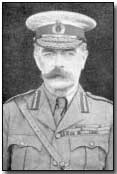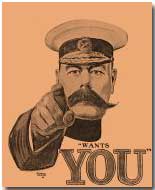Who's Who - Horatio Herbert Kitchener
 Horatio Herbert Kitchener (1850-1916)
was born on 24 June 1850 near Kerry in Ireland.
Horatio Herbert Kitchener (1850-1916)
was born on 24 June 1850 near Kerry in Ireland.
Trained at the age of 18 at the Royal Military Academy, Woolwich until 1870, Kitchener served briefly with the French Army of the Loire before receiving a commission into the Royal Engineers in 1871.
Following duty in Palestine and Cyprus he was attached to the Egyptian army in 1883, at that time being re-organised by the British army. Kitchener took part in the unsuccessful operation to relieve General Gordon at Khartoum in 1884-85.
Appointed Governor General of Eastern Sudan in 1886, a position he held until 1888, he helped turn back the last Mahdist invasion of Egypt in 1889.
Made commander of the Egyptian army in 1892, he began the reconquest of Sudan in 1896 having re-organised the army in the interim. A series of victories culminated in the battle of Omdurman and the reoccupation of Khartoum in 1898. Later that year he forestalled a French attempt to claim part of Sudan; he was subsequently made governor of Sudan.
Appointed chief of staff to Lord Roberts during the Boer War in 1900, Kitchener re-organised transport, led an (unsuccessful) attack on Paardeberg and suppressed the Boer revolt near Priska.
Lord Roberts returned to England at the close of 1900, leaving Kitchener behind to mop up continued guerrilla resistance, a task that took until 1902 and for which Kitchener was much criticised.
Kitchener was crated Viscount and sent to India as commander in chief of the British forces situated there, remaining in the position until 1909, when he was made Field Marshal.
Kitchener served as Consul General to Egypt from 1911-14, being made an earl in 1914.
 With
the outbreak of the First World War Kitchener was recalled to England and
made secretary of state for war. Almost alone among his colleagues
Kitchener foresaw a war lasting several years, rather than months, and
planned accordingly.
With
the outbreak of the First World War Kitchener was recalled to England and
made secretary of state for war. Almost alone among his colleagues
Kitchener foresaw a war lasting several years, rather than months, and
planned accordingly.
He vastly expanded the army from 20 to 70 divisions within two years. The most famous recruitment poster in history depicted Kitchener with finger outstretched: "Your country wants you!"
Kitchener effectively oversaw war strategy for the first year and a half of the war; after the Mons battle in 1914 he travelled to Ypres to stiffen the weakening resolve of Sir John French, commander of the British Expeditionary Force (BEF).
Unfortunately his relations with the rest of the war cabinet were strained. Kitchener was difficult to work with, finding it hard to develop close working relationships with colleagues. Following an attack by Lord Northcliffe's newspapers in 1915 over a shortage of shells, responsibility for munitions was taken from him; later that same year he was stripped of control over strategy.
Kitchener offered to resign from the cabinet, but his overwhelming popularity in the country at large made the government fearful of the consequences of allowing him to leave the cabinet.
Kitchener's involvement with the disastrous Dardanelles campaign led to a further tarnishing of his reputation among the cabinet.
Sent on a mission to Russia in June 1916 to encourage continued Russian resistance to Germany, Kitchener's ship, H.M.S. Hampshire struck a German mine off the Orkneys and sank; Kitchener was drowned on 5 June 1916.
'Billy' was the Australian nickname for a cooking-pot or can.
- Did you know?
